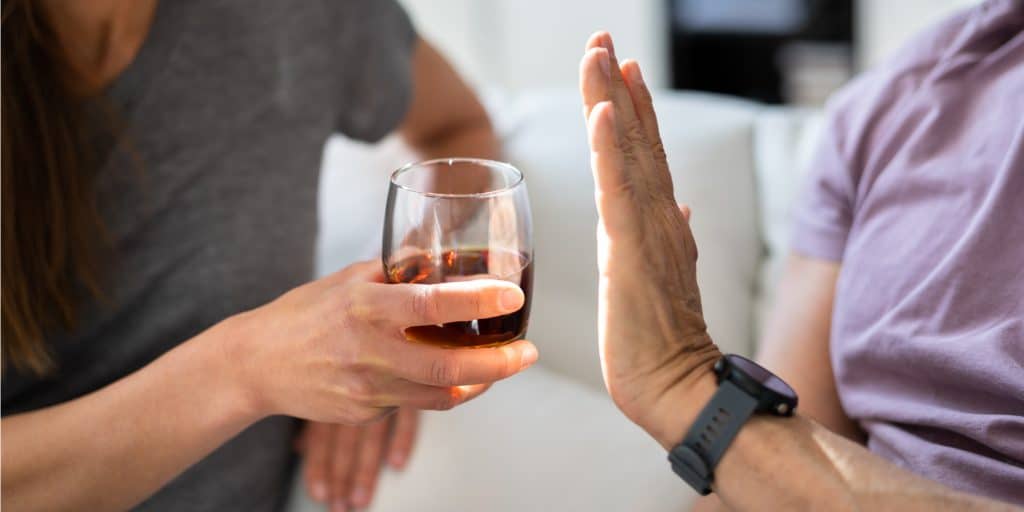
Over half of the adults in the United States have consumed an alcoholic beverage in the past month. For some, this can be a source of pain and struggle. They might drink more than they want to or have a difficult time understanding how to stop drinking once they start.
In the long term, this can lead to a dependence on alcohol, which is often detrimental to one’s physical well-being, mental health, and relationships. People who grapple with alcohol addiction may deal with complications such as high blood pressure, heart disease, magnified depression, and unemployment. To avoid these difficulties or prevent them from worsening, it’s important to know how to identify and acknowledge when drinking has become a problem.
Table of Contents
Is It Time to Stop Drinking Alcohol?

When you find yourself asking if it’s time to quit drinking, the chances are likely that the answer is yes. Accepting the impact alcohol has on your life is the first step to overcoming its influence and moving toward recovery.
First, assess your drinking habits. If you are a heavy drinker or someone who engages in binge drinking, you are at a higher risk of alcohol use disorder. Men fall under one of these excessive drinking patterns if they drink 15 or more drinks per week or five or more drinks on a single occasion. For women, the same is true if they drink eight or more drinks per week or four or more drinks on a single occasion.
By itself, instances of excessive drinking do not necessarily guarantee that you’re chronically misusing alcohol. So if you’re still uncertain, consider the following signs of alcohol use disorder. Someone whose alcohol consumption has reached an unhealthy level may face a variety of physical, mental, and social cues that they need a change.
Ask yourself if your drinking habits have ever:
- interfered with your job, school, or family life
- persisted even though drinking made you feel worse
- taken the place of activities you once enjoyed
- caused you to drink more than you planned or wanted to
- prevented you from remembering parts of your day
If you answered yes to any of the above, then it may be time to quit and learn how to stop drinking alcohol.
Alcohol Addiction as a Symptom
Many people know alcohol addiction as its own disorder, but it often stems from another, underlying problem. Both will need to be addressed to make a full recovery and minimize the chance of relapse in the long term.
Sometimes, the underlying problem starts out as a simple issue that someone would rather forget, but in other cases, there is another mental health disorder present. These are referred to as co-occurring disorders. Common instances of disorders that occur alongside alcohol misuse include depression and anxiety disorders, post-traumatic stress disorder (PTSD), and bipolar disorder.
Most people turn to alcohol for a reason, but it is not a healthy coping mechanism. To learn how to stop drinking, you will also need to learn better methods of coping with stress and trauma. One way this can be done is through a dual diagnosis program, which offers specialized, comprehensive treatment for both alcohol use disorder and its co-occurring disorders.
Learn How to Stop Drinking Alcohol
If you’ve decided it’s time to stop drinking alcohol, you may be wondering what your next steps are. Everyone’s journey is unique to them, but here are a few tips to help you get started.
1. Understand the Process of Alcohol Rehab
Opening a discussion about how to stop drinking is an excellent start to recovery. The next step for many people who seek addiction treatment is to undergo a detoxification process. The purpose of a detox is to eliminate your body’s physical dependence on alcohol by removing it from your system. This can incite alcohol withdrawal symptoms, but at The Blackberry Center, your symptoms and vitals would be monitored constantly. Trained medical staff can help alleviate discomfort during detox.
After detox, you can begin the next phase of treatment. At The Blackberry Center, you would enroll in a dual diagnosis program, where you would be provided with specialized care catered to your needs. Most often, this means partaking in group and recreational therapies, following a 12-step model, and frequent communication about your progress with mental health specialists devoted to your recovery.
On a day-to-day basis, you could expect group therapy sessions where you meet with others to discuss addiction and develop new coping skills. In this way, you can prepare to live a sober, healthy life after completing alcohol addiction treatment. Our dual diagnosis program also utilizes evidence-based recreational therapy to develop key communication and life skills through team building activities, sports, logic games, and arts projects. And during your stay at our Florida alcohol rehab, your recovery will be fueled by a nutritious diet of healthy, delicious foods.
From there, your recovery plan would likely take on its own shape as it adjusted to suit your individual needs. Rest assured that this doesn’t mean you wouldn’t know what to expect. The Blackberry Center affirms that it’s important to “begin with the end in mind.” In practice, this idea translates to discharge planning, which starts from day one. Discharge planning helps you feel as prepared as possible for every phase of your addiction treatment by creating a concrete, actionable plan for your long-term sobriety.
2. Prepare for Withdrawal Symptoms and Other Challenges

One obstacle you may encounter is alcohol withdrawal. If you quit drinking cold turkey, you are at risk of experiencing symptoms such as hallucinations, heart palpitations, and in severe cases, seizures.
For these reasons, you should only try to detox from alcohol with support from trained professionals. At The Blackberry Center, detoxing from alcohol means receiving 24/7 medical monitoring and support to keep you sober and safe during this vulnerable period of recovery. Not only does symptom management keep you as comfortable as possible during the detoxification process, but being in a safe, sober environment can help you avoid relapse at the beginning of your recovery.
Another challenge that comes with addiction treatment is having to unearth difficult feelings. Remember that most people drink as a means to cover up or distract from a problem of some kind. Because of this, expect there to be a transitional period while you’re developing healthier coping skills. As you learn to process your emotions without the influence of alcohol, it will become easier to speak about them.
3. Choose the Right Environment and Build a Support Group
Recovery starts with you, but what goes on around you can be just as crucial. A chaotic, unstable environment is not conducive to learning how to stop drinking alcohol. On the other hand, surrounding yourself with tranquility can make it much easier to maintain a positive outlook.
If you’re unable to find a calm, sober environment at home, you have other options. Support groups such as Alcoholics Anonymous (AA) offer a great starting point for someone looking to build a healthy, pro-recovery environment.
That being said, keep in mind that AA groups should not be viewed as replacements for professional, medical addiction treatment. Participating in AA can help you develop a sense of fellowship and camaraderie with others who grapple with alcohol addiction, but it won’t provide you with the same level of intensive, specialized care as a residential treatment facility.
To receive that degree of devoted addiction treatment, consider The Blackberry Center as a prime example. We supply our inpatient clients with all the amenities they could find at home, while furnishing our facilities with comfort in mind. Inpatient treatment also provides you with essential support from addiction specialists to help you learn how to stop drinking for good. These specialists can guide you through behavioral and recreational therapies, dietary planning, medication management, and more.
Choosing an inpatient treatment plan guarantees you will have consistent access to a peaceful, uplifting environment full of individuals who want to help you succeed. Even something as simple as that newfound sense of stability can have a monumental impact on your mental health as you set out to confront alcohol addiction.
4. Don’t Give Up on Breaking Your Drinking Habits
It’s a long journey, and recovery may not be a linear process, but every step you take is an important one. By taking advantage of the resources available, you can immerse yourself in a secure environment and build a support system that will help you through the struggles that may lie ahead.
At The Blackberry Center, this includes taking precautionary measures to inform yourself of the warning signs of relapse. During treatment we will work with you to create a comprehensive relapse prevention plan to help you avoid relapse. We prioritize long-term recovery by providing our clients with healthier coping methods and teaching them about tools they can use to stay sober.
Most importantly, no one at The Blackberry Center will give up on you. The staff and patients support each other, celebrate victories together, and bolster those who need a helping hand. As long as you don’t give up on yourself, either, there is always a path forward. With time, dedication, and empathy, you can learn how to stop drinking for good.
5. Ask for Help to Stop Drinking Alcohol
Taking the steps you can to set yourself up for success is very important. It can lay the groundwork for your path to recovery and reintroduce a sense of control into your life. However, it’s also vital to remember that this is not a struggle you need to tackle by yourself.
It’s normal to experience feelings of loneliness and isolation when you’re battling alcohol addiction, but you are not alone. According to the National Institute on Alcohol Abuse and Alcoholism, almost 15 million people in the United States live with alcohol use disorder. When you ask for help, you can meet peers who will relate to your fight and support your journey to become alcohol free.
It can feel intimidating to seek professional help, but it doesn’t have to be. At The Blackberry Center, you can learn how to stop drinking in a safe and supportive environment. For more information, call our admissions team at 888-512-9802 or submit a confidential form online.
The post How to Stop Drinking Alcohol: 5 Tips for Success appeared first on The Blackberry Center of Central Florida.
Source
Original Author: The Blackberry Center

